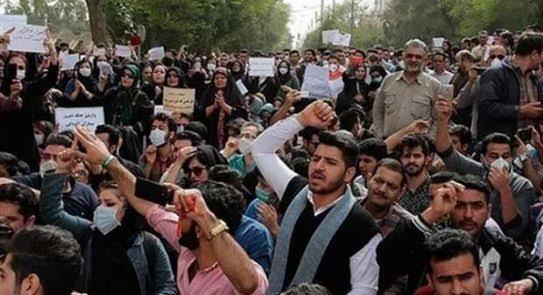The outbreak of protests in the Iranian city of Ahwaz is not a new phenomenon, several similar waves of unrest have previously taken place, the latest in November 2019. This time, however, the situational context is noteworthy: the incumbent president Ibrahim Raisi will soon start his first term on August 5th, there are ongoing efforts by international powers to resume nuclear negotiations in Vienna, and there is increasing international pressure on Iran, as a result of its continued interference in various regional crises and the internal affairs of several Arab countries.
Ongoing politicization:
The protests erupted in the Khuzestan province, moving to other provinces, and even reaching the capital Tehran, prompted by the deterioration of infrastructure and the government’s inability to provide basic needs, such as stable electricity and water. The diversion of the Karun River, which originates in Ahwaz, has led to a lack of fresh water and electricity cuts, moreover, there are severe droughts, the likes of which Iran has not seen in fifty years.
Although the driving force behind the protests is economic, there is a political element to them:
1. Pressure on the president: The eruption of protests ahead of President Ibrahim Raisi’s inauguration on the 5th of August send him a clear warning that the current approach of providing additional support to Iran’s regional allies at the expense of addressing domestic crises must change. This may be seen as linked to Raisi’s statements in his first press conference following the announcement of the election results on June 21, where he stated that “Iran’s activities in the region and its ballistic missile program are non-negotiable,” suggesting that Iran will continue its current policy of supporting loyal militias in various countries, in a way that could result in the continued depletion of the Iranian treasury.
2. Possible involvement in Afghanistan: It is important to highlight that the protests coincide with Iran’s increasing involvement in the Afghan crisis, as the US military prepares to withdraw from the country. Reports revealed that Iran is preparing to replicate Iraq’s “Popular Mobilization of Militia” in Afghanistan, under the pretext of confronting the Taliban and ISIS, although it has shown interest in opening channels of communication with the former and not been susceptible to attacks by the latter from across the Afghan border. It seems that Iran will rely, in this context, on Fatemiyoun Brigade militia, which it helped form, and which participated in the military confrontations that took place on the Syrian front in favor of President Bashar al-Assad’s regime. This will in turn impose further burdens on Iranian resources, at a time when the conflict is escalating, due to the internal economic crisis that began as a failure of the government of President Hassan Rouhani to counteract the repercussions of the US sanctions imposed on Iran by former US President Donald Trump on May 18th, 2018.
3. Complicating Efforts to resume Vienna negotiations: The international community seeks to continue the Vienna negotiations, after the seventh round has been postponed by Iran until the new president takes office and forms a new government. It is important to note that many parties have made efforts to expand the scope of the negotiations to include other issues currently not discussed, such as the ballistic missile program and the status of human rights, or to get a commitment from Iran that these issues will be discussed in later rounds of talks.
The protests are likely to add fuel to the increased interest from the international community in human rights issues in Iran. For example, the issue was discussed by the opposition group Mujahidi Khalq, in Paris on July 10th, in the presence of foreign officials including the Prime Minister of Slovenia Janis Jansa. Jansa stated that “the Iranian people deserve democracy, freedom, and respect for human rights, and must gain strong support from the international community,” calling for “the Iranian regime to be held accountable for its violation of human rights.”
Moreover, prisoner exchange negotiations between Iran and the United States have collapsed, leading to the exchange of accusations on using this issue to influence the Vienna talks. Many Western countries have criticized Iran for its continued use of foreign prisoners as a tactic during negotiations, and have accused Iranian authorities of violating the human rights of these prisoners.
In short, it does not seem that the protests in Ahwaz, that have begun to spread to other regions and provinces, will be the last of their kind, especially as the demands are not being addressed. The Iranian regime has continued to adopt the same policy in dealing with domestic issues and regional crises, which makes any progress difficult to achieve both domestically and internationally.

